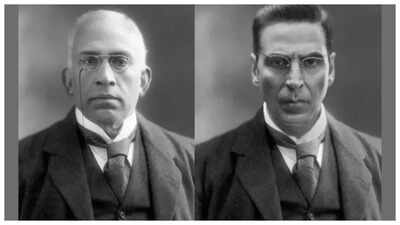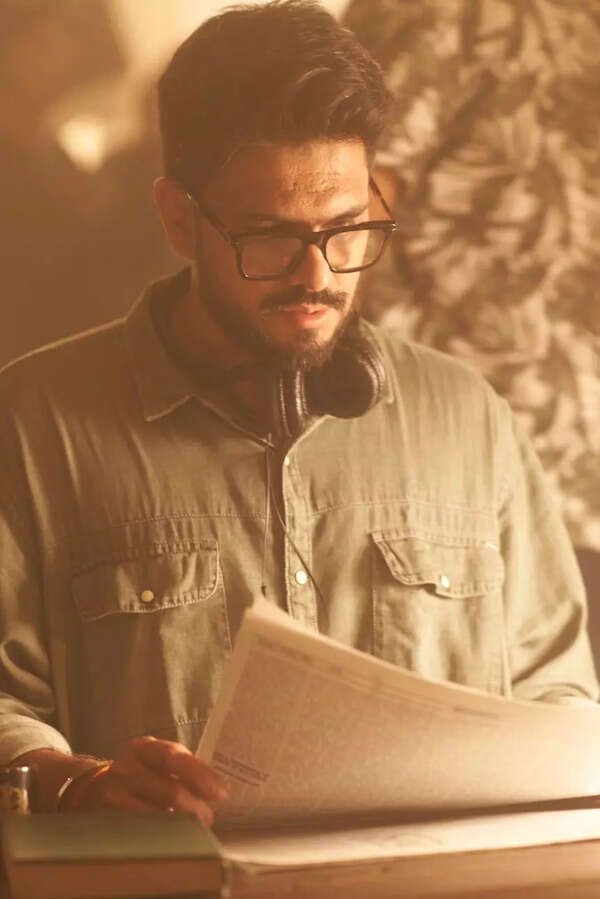
In an exclusive conversation, debutant director Karan Singh talks about his maiden film
Kesari Chapter 2
which is adapted from Raghu and Pushpa Palat’s book
The Case That Shook The Empire
, what drew him from Harvard Law School to Bollywood, and why shooting the
Jallianwala Bagh massacre
sequence left everyone on set in tears.
In a year where Bollywood has seen quite a range of movies from Chhaava to Nadaniyaan ti Sikandar to Jaat, debutant director Karan Singh steps into the spotlight with Kesari Chapter 2. An emotionally charged historical drama adapted from Raghu and Pushpa Palat’s book The Case That Shook The Empire, the film delves into one of the most overlooked yet powerful chapters of India’s freedom struggle — the legal battle fought by Sir Sankaran Nair against the British Empire after the Jallianwala Bagh massacre.

‘We had to pick highlights and build a transformational arc’
When asked about the changes from book to film, Karan is refreshingly honest.
“From the start, we wanted the story to reach the widest possible audience. A courtroom case spanning several months can’t be compressed into two hours without taking a few creative calls. But we were always clear about staying true to the soul of Sankarab Nair’s story. I wanted the entire country to know about Sankaran Nair's bravery who went on from being a British loyalist to the biggest patriot of India. ,” he says.
He reveals that it was a colleague Atmika Didwania who stumbled upon the book and passed it to him — a discovery that instantly riveted him.
“We all know about the Jallianwala Bagh massacre, but what most of us didn’t know was that it was a premeditated conspiracy. And that one man stood up to the British Empire, legally fought them, and took the story to the world. That story had to be told.”
From Harvard Law School To Bollywood
Karan’s own journey is straight out of a movie script. A Harvard Law School graduate, he was working in law firms across New York, Boston, and Paris, while nursing a long-time love for Bollywood.
“Even while working abroad, I’d walk through snow, rain, whatever, just to catch a film. Watching movies was my religion,” he smiles.
“I wrote a lot — articles, opinion pieces — and realised I loved crafting narrative arcs. That slowly nudged me towards filmmaking.”
He took a one-year sabbatical from law to test the waters, and never went back.
Directing Akshay Kumar
Getting a debut film green-lit by a major production house is one thing. Getting Akshay Kumar to headline it is another. But Karan insists the superstar was both professional and collaborative.
“By the time we reached the set, we’d spent so much time together dissecting the material that it was a smooth, beautiful process. He simply understood the core emotion behind telling the story.. The core emotion was that we wanted to honour the lives of people who died at Jallianwala Bagh. Those people at Jallianwala Bagh came to celebrate Baisakhi and they left as martyrs. And then the hard work and the preparation that Akshay sir put in. We have spent years just reading the script together. We have spent years just discussing, dissecting each and every scene, the motivation behind each and every scene. So what you see on screen is a lot of hard work that went behind..”
The Scene That Left Everyone Weeping
One of the most gut-wrenching moments in the trailer is the Jallianwala Bagh massacre sequence — a moment Karan says was as emotionally devastating to shoot as it is to watch.
“Everyone was weeping. Even the stuntmen, hardened action directors — no one was unaffected. There’s a shot where Pargat ( Krish Rao) was walking with his dead sister in his arms, and the whole set broke down.We were just some people who are trying to recreate that. And it just shocks me to the core what those people on April 13, 1919 would have felt.. In fact, one of the main reasons why we have made this film is that I was stunned to know that the Britishers had spread a fake narrative. They're called innocent children as terrorists. They're called people who came to the Bagh to celebrate Baisakhi and to protest peacefully, they called them rioters. So the reason why we made this film is to demolish this narrative once and for all and to bring the truth out in the open.”
He adds that recreating this on camera made them reflect on what it must have actually been like for those who lived through it.
On Sardar Udham And Ram Madhvani’s Series
Karan acknowledges the other works on the same subject but is clear his film has a different focus.
“I loved Sardar Udham. Shoojit Sircar is a filmmaker I deeply respect, and the last 30–40 minutes of his film are outstanding. I haven’t seen Ram Madhvani’s The Waking of a Nation yet, but his work inspires me too.”
Closing Thoughts
Kesari 2 is more than a courtroom drama. It’s a story about courage, conscience, and standing up against oppression. And it’s clear from my conversation with Karan Singh that this is a filmmaker driven not by box office numbers, but by the urge to tell stories that matter.
As he puts it: “This film is for the people who lost their lives at Jallianwala Bagh. It’s for Sankaran Nair, who dared to fight. And it’s for this country, to remember the sacrifices we so easily forget.”

 6 hours ago
38
6 hours ago
38




























 English (US)
English (US)